Table of Contents Show
Used vs new RV? It’s a debate as old as time.
Whether you’re a seasoned traveler or a first-time road tripper, the decision to buy a recreational vehicle is a monumental one, riddled with choices that could define your journey.
At the forefront of this decision is the age-old dilemma: Do you invest in the shiny allure of a brand-new RV, or do you opt for the seasoned character and potential savings that come with a used counterpart?
Your personal preferences and situation should ultimately determine whether you opt to buy new or used. In this exploration of the open road, we’ll navigate the twists and turns of deciding between a new or used RV, weighing the pros and cons of each path.
So, fasten your seatbelt and join us as we hit the highway of decisions, helping you determine which route best suits you. The adventure begins here—let’s roll!
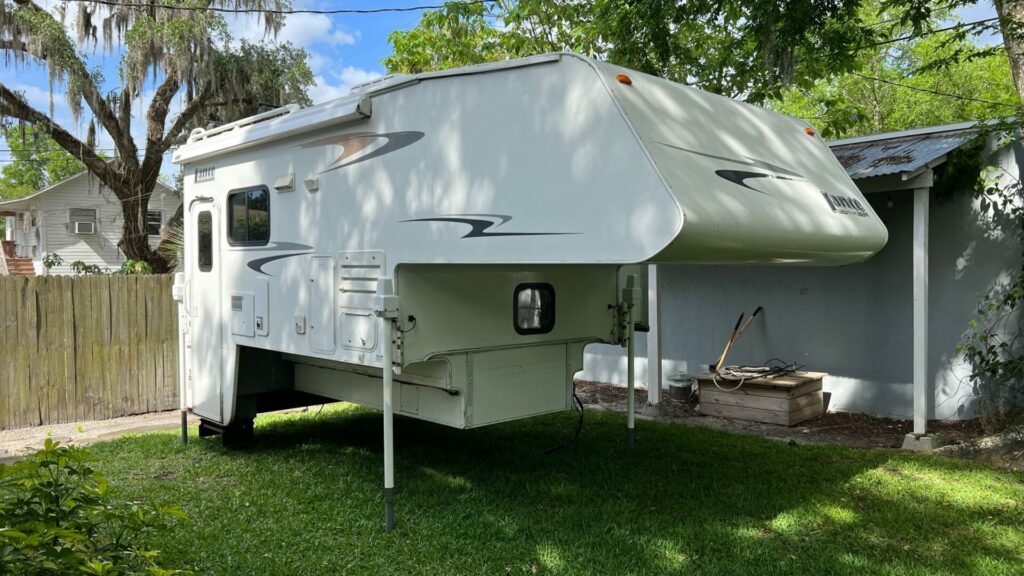
Pros of Buying a Used RV
Buying a used RV comes with several advantages that might appeal to you. Below are some notable pros of opting for a used RV.
Initial Depreciation
New vehicles typically experience rapid depreciation in their first few years. By choosing a used RV, you can avoid absorbing this initial loss in value, potentially saving a significant amount of money.
Upgrades and Accessories
Many used RVs come with added features and accessories that were installed by the previous owner. This could include solar panels, lithium batteries, upgraded entry door locks, upgraded tires, and many other features.
We lived in our fifth wheel for five years before we sold it. That’s years of upgrades, custom builds, and fine-tuning we did to perfect our RV. We can safely say the features our buyers walked away with are nothing you could get off the lot.
Worked-Out Issues
New RVs may have unforeseen problems or manufacturing defects that only become apparent after the first year or two of use. When you buy a used RV, the previous owner may have already addressed and resolved such issues.
When comparing used vs new RVs, you might think the older rigs would have more issues, but that’s not always the case. We’ve had fewer problems with our used truck camper than our brand-new fifth wheel.
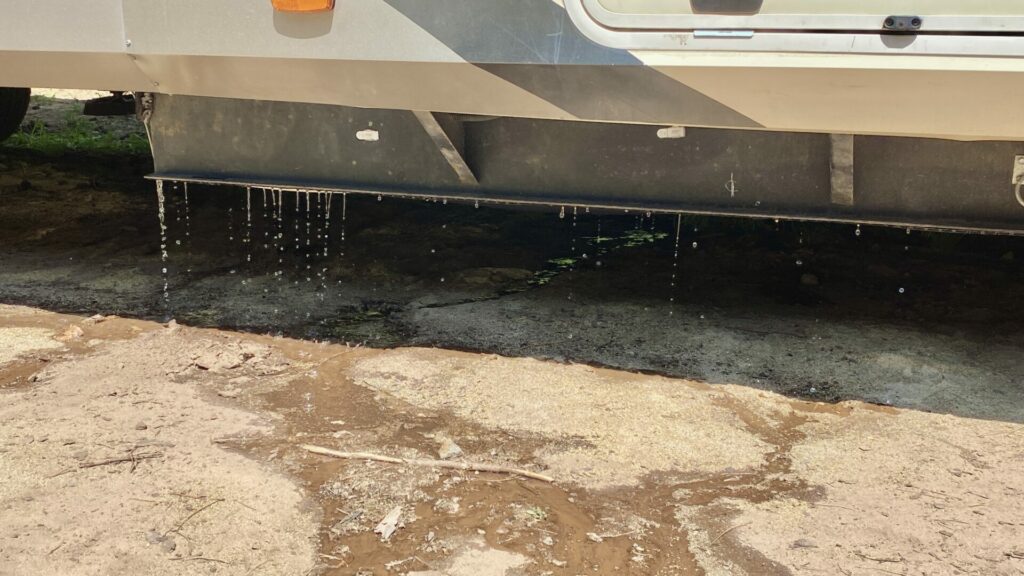
Flexible Pricing
There’s often more room for negotiation when buying used. Sellers may be willing to adjust the price based on the condition of the vehicle, allowing you to secure a better deal.
Even when buying from a dealership, the salesman may have more flexibility to lower the price on a used RV rather than a new one.
Maintenance History
Many responsible RV owners keep detailed maintenance records. Access to these records can provide valuable insights into how well the RV has been cared for, helping you gauge its overall condition.
When we sold our fifth wheel, we handed over a binder with detailed records. It included receipts for all of the warranty work we had done on the RV, a list of maintenance items we performed, and all of the paperwork we received when we bought it new.
No Waiting Time
Unlike ordering a new RV and waiting for it to be manufactured, a used RV is readily available. This means you can hit the road sooner and start enjoying your travels without delay.
Even when buying a new RV off the lot, you will still have a waiting period as the dealership needs to get it ready for its pre-delivery inspection. This could take days or even weeks. When buying used, you simply pay and go.
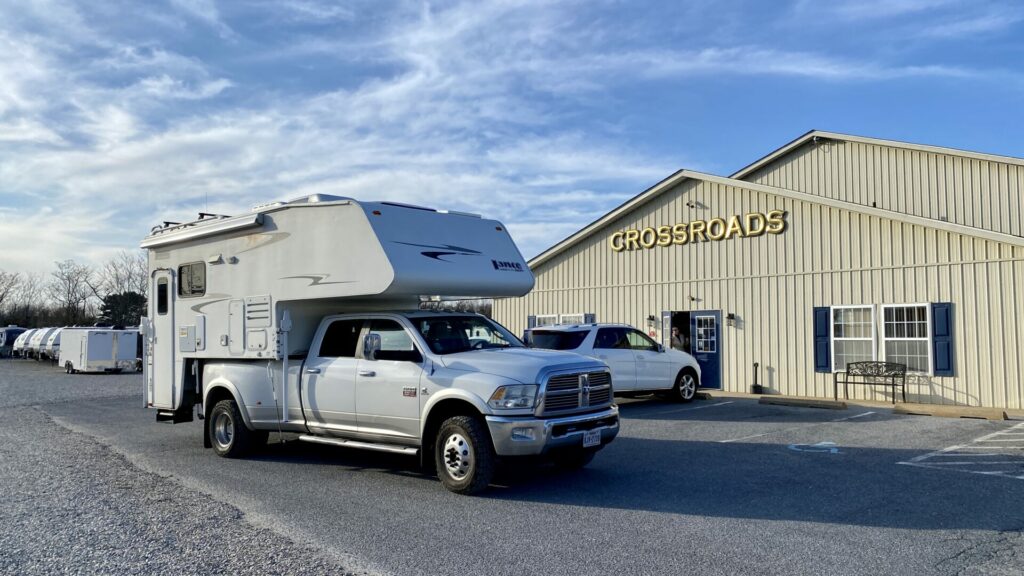
Financials are key when you are thinking about a used vs new RV. Insurance premiums for used RVs are generally lower than those for new models. This can contribute to ongoing cost savings over the life of your ownership.
Reduced Taxes and Fees
In many places, registration fees and taxes are based on the vehicle’s value. Since used RVs are generally less expensive than new ones, you may benefit from lower ongoing costs associated with ownership.
Cons of Buying a Used RV
While there are many advantages to buying a used RV, it’s important to consider the potential drawbacks as well. Below are some cons associated with purchasing a used recreational vehicle.
Condition Varies
Used RVs can vary significantly in terms of wear and tear vs new, depending on how well they were maintained by previous owners. Some may be in excellent condition, while others might require extensive repairs.
It can be tough to walk away from your dream rig because of the condition it is in. However, you might have to, as it could cost you more down the line.
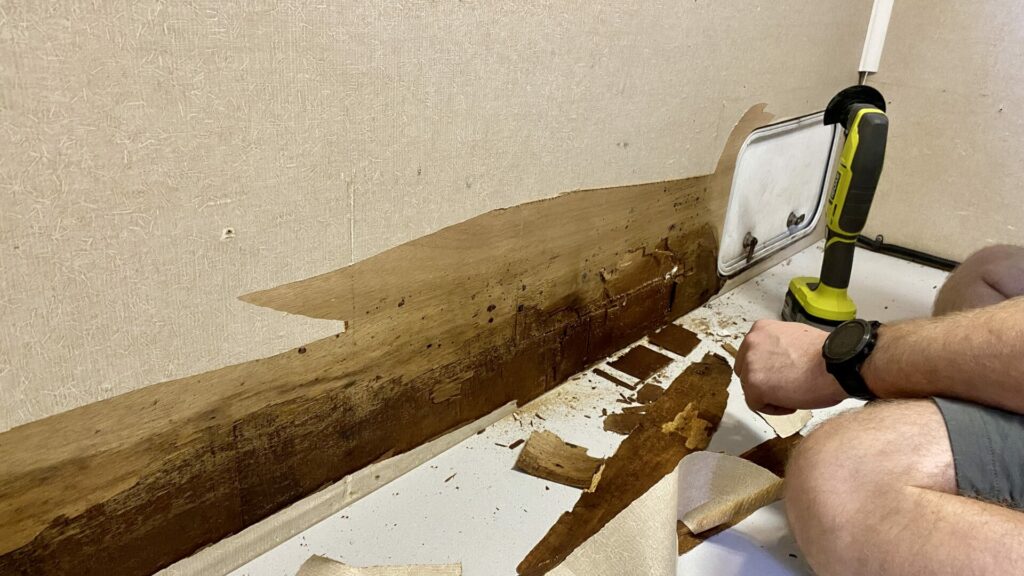
Technological Advancements
Older models may lack the latest technological features and amenities that come standard in newer RVs. If having the latest gadgets and conveniences is a priority, a used RV might not fulfill those expectations.
Obsolete Parts
As RVs age, certain components may require repairs or replacement. Finding replacement parts for older RV models may become challenging as manufacturers discontinue certain components.
We’ve experienced this first hand with our 2006 Lance Truck Camper. Finding replacement vent covers, refrigerator components, and toilet was extremely challenging during our renovation.
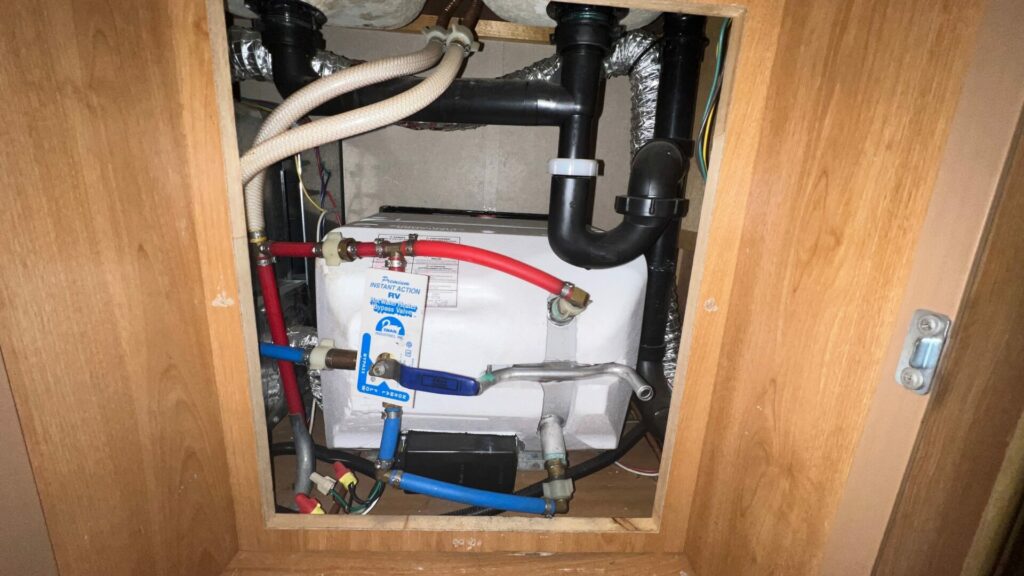
Potentially Higher Fuel Consumption
Older motorhomes may not be as fuel-efficient as newer ones, which could result in higher fuel costs over the lifetime of the vehicle. While the cost difference might not be significant, this is still something to consider if you’re looking at Class A, B, or C motorhomes.
While some owners maintain detailed records of maintenance like we did, others may not. Without a comprehensive history, it can be challenging to assess potential hidden issues or past accidents.
This is why it’s important to hire an RV Inspector when buying used. They are trained to spot hidden problems and might catch something you missed.
Higher Interest Rates
We know it’s most people’s goal to buy a used RV outright, but if you are financing, it’s important to know financing a used RV might come with higher interest rates compared to financing a new one.
Pros of Buying a New RV
Buying used isn’t for everyone. Let’s review the pros of buying a new RV, so you can consider if this option is right for you.
Latest Features and Modern Design Aesthetics
New RVs often come equipped with the latest features, technology, and design innovations. We’ve noticed a significant change in RV decor and features in the last few years.
With not much changing in the RV industry in the last ten years, manufacturers are finally coming around to light interiors and out-of-the-box features. We couldn’t be more pleased with the changes, and if modern design and new technology are important to you, then a new RV might be the right choice.
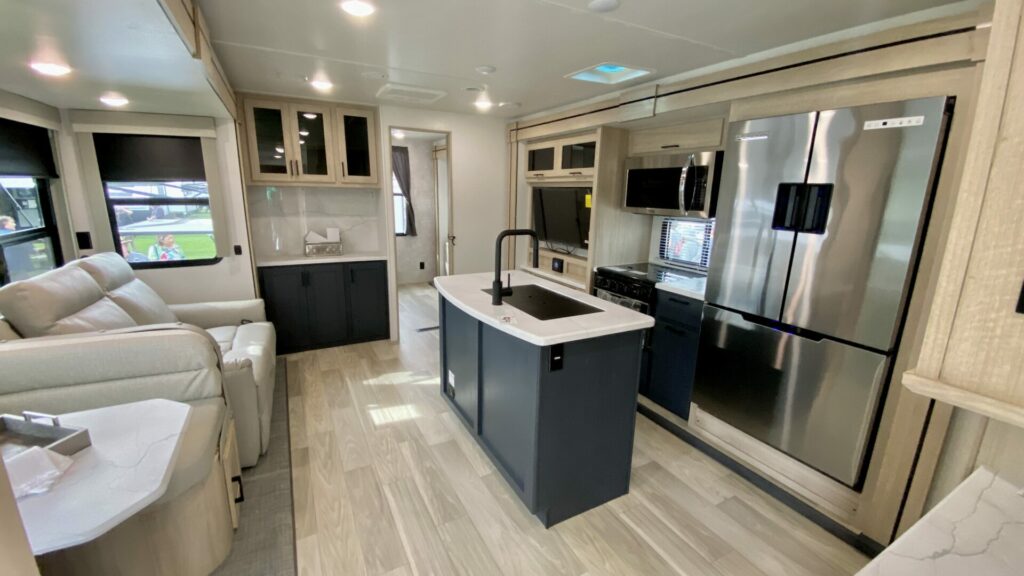
Full Manufacturer Warranty
New RVs typically come with a manufacturer’s warranty. You’ll have to research each manufacturer’s specific warranty offerings, but most cover bumper to bumper for one year and structural for three years.
If you aren’t handy, a warranty can provide peace of mind and financial protection against unexpected repairs. Additionally, some manufacturers, like Grand Design, Keystone, and Luxe, ensure their warranties cover full-time living.
Lower Interest Rates
Financing a new RV may come with lower interest rates vs financing a used one. This can result in lower overall financing costs and more favorable loan terms.
Manufacturer Incentives
Manufacturers may offer incentives, promotions, or special financing options for new RVs, providing additional value to the buyer.
When comparing used vs new RVs, it’s important to determine if the incentives or promotions for a new RV are comparable to the savings of a used RV.
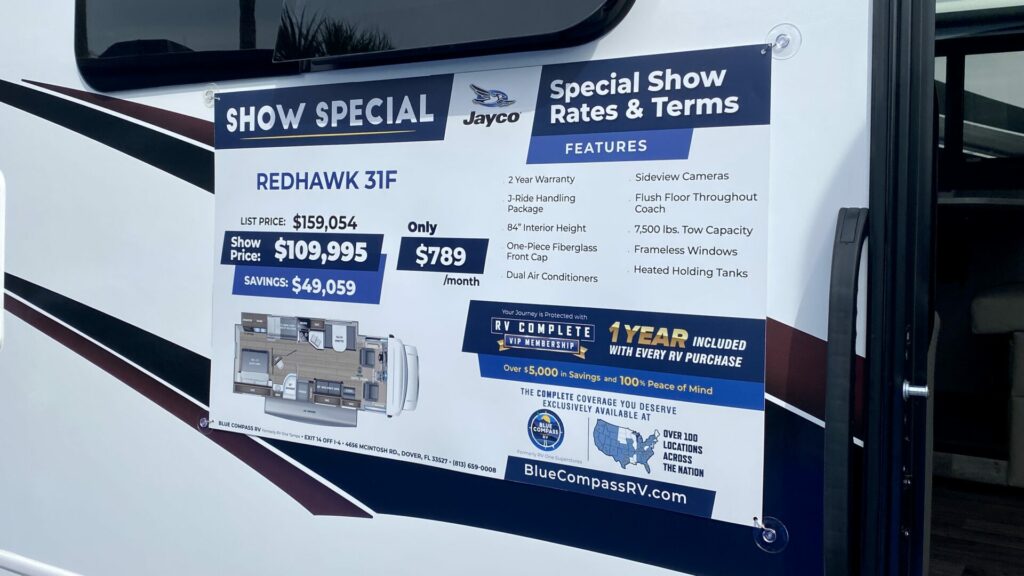
Reliability and Predictability
Knowing the complete history of your RV from day one can provide a sense of reliability and predictability, offering confidence in the performance and longevity of your investment.
Granted, every RV will need repairs and proper maintenance, but some folks like knowing they’ve been the only one to perform such tasks on their RV.
Cons of Buying a New RV
While purchasing a new RV comes with several benefits, there are also potential drawbacks that buyers should consider. Let’s review some cons associated with buying a new RV.
Substantial Investment
New RVs generally come with a higher upfront cost vs used ones. This initial expense can be a significant consideration for budget-conscious buyers.
Many people sell their homes to buy a new RV and use the rest to live off. It’s always risky to put all of your eggs in one basket like this. It’s important to know your budget and stick to it when RV shopping.
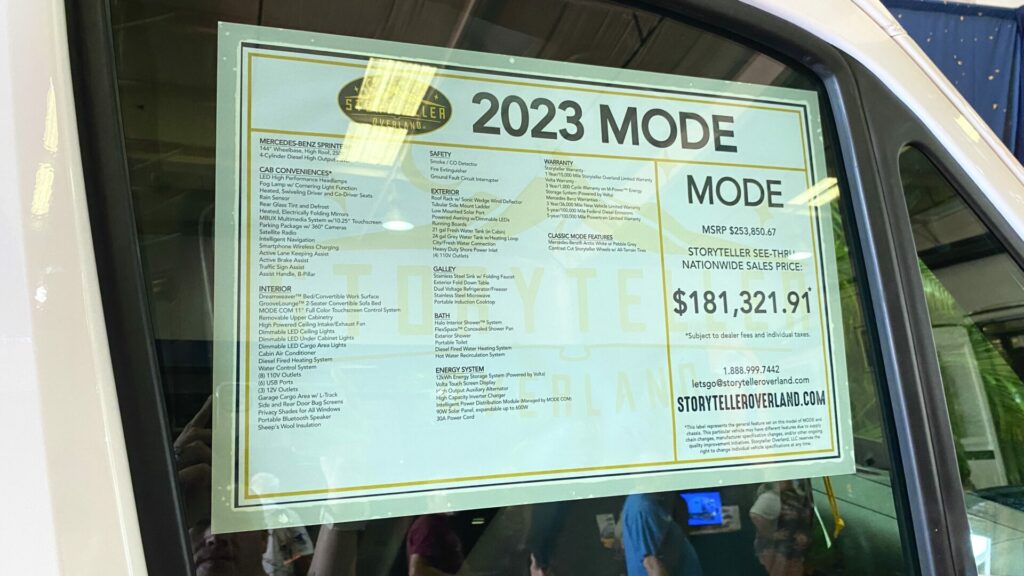
Rapid Depreciation
Similar to new cars, new RVs experience rapid depreciation the day you take it off the lot. Not only are new RVs typically more expensive vs used, but they’re worth less down the road.
Be sure to consider how long you plan on owning your RV before you buy. If it’s not that long, maybe a new RV isn’t the right choice.
Initial Quality Issues
New RVs may have unexpected manufacturing defects or glitches that become apparent only after regular use. While covered under warranty, addressing these issues can be inconvenient, especially if you plan on full-timing.
Don’t think that just because you’re buying a new RV, it won’t have any problems. When we purchased our new RV, all of the major issues worked themselves out in the first year, and we still had problems after that.
Insurance premiums for new RVs are typically higher than those vs used models. The higher value of the vehicle contributes to increased insurance costs. Be sure to consider this when doing your budget for buying an RV.
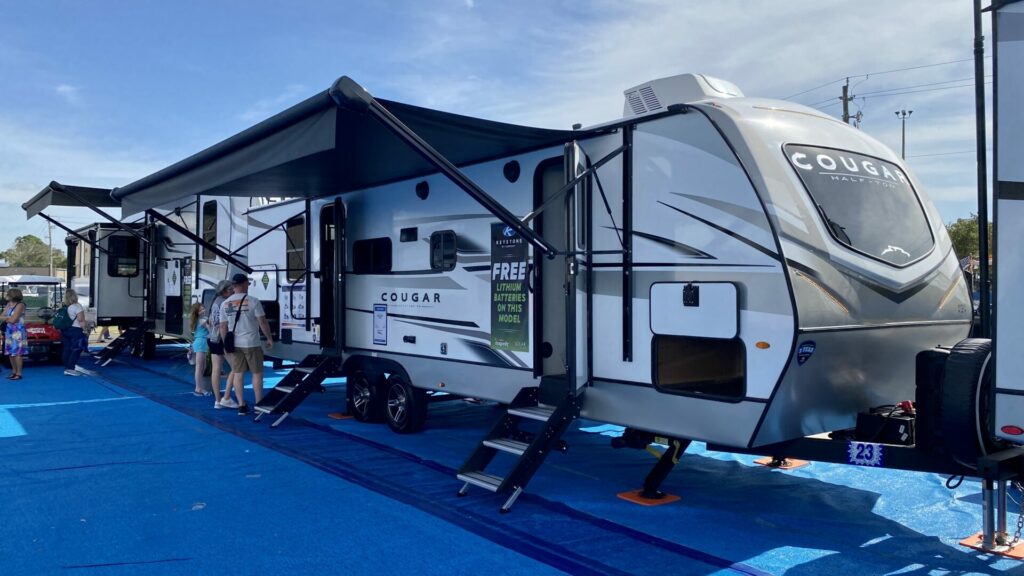
Waiting Time for Custom Orders
If you choose to custom order a new RV with specific features, you may have to wait for the manufacturing process to be completed before taking delivery.
This waiting period can vary and might delay your travel plans. You can check out Facebook groups for the specific make and model you are ordering to see how long other customers had to wait for their new RV.
Other Things to Consider When Comparing Used vs New RVs
Now you have a high-level overview of the pros and cons of buying either a new or used RV. But we’re not done yet!
By carefully considering the factors below, you can make a more informed decision about whether to go for a used or new RV that aligns with your preferences, budget, and travel aspirations.
Budget
One of the single largest considerations you have when buying a new RV or travel trailer is the purchase price. Most buyers have a budget that they must stay below, and they want to get the most for their money.
Be sure to evaluate your budget not only for the initial purchase but also for ongoing expenses like insurance, maintenance, fuel, and campground fees. This will help you determine the overall cost of ownership.
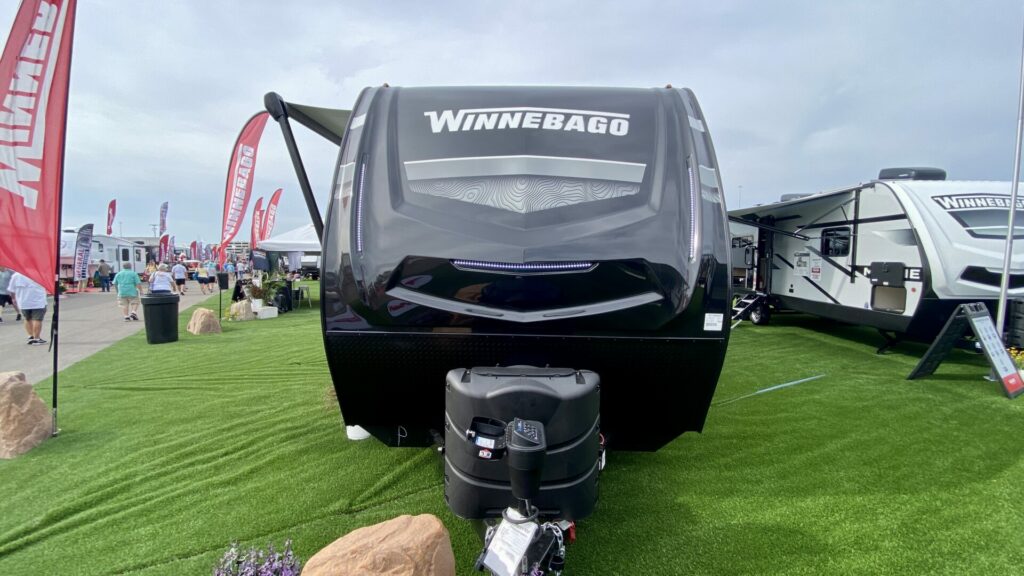
Type of RV
Decide whether you want a motorhome (drivable RV) or a towable one (travel trailer or fifth wheel). Each type has its advantages and disadvantages, and your preference may influence whether you go for a new or used model.
Pro Tip: If you’re still undecided, you can read our article on the Important Differences When Comparing Motorhome vs Travel Trailer.
Layout and Floor Plan
Consider the layout and floor plan that best suits your needs. New RVs often come with modern and innovative layouts, but you may find used models with layouts that appeal to you as well.
There are literally thousands of RV floorplans out there made by dozens of different manufacturers. Purchasing new will afford you the greatest number of options and choices.
However, your choices are more limited if you decide to go the used route. You are limited to what is for sale at the time you are looking. If you are dead set on a specific brand or floor plan, it may take some time to find what you are looking for.
Either way, go to your local dealer to peruse options and begin nailing down what you like and don’t like in an RV floor plan.
Resale Value
If you plan to upgrade or sell your RV in the future, consider the potential resale value. New RVs depreciate rapidly in the first few years, whereas certain used models may hold their value better.
If you plan to keep the RV for the long term, then you may want to go ahead and buy a new one. You may not be concerned with the depreciation because you have no intention of selling it any time soon.
If, however, you like to get a different RV every few years, you should consider shopping for a used one. This prevents you from taking a big hit on depreciation, and the overall purchase price is generally lower.
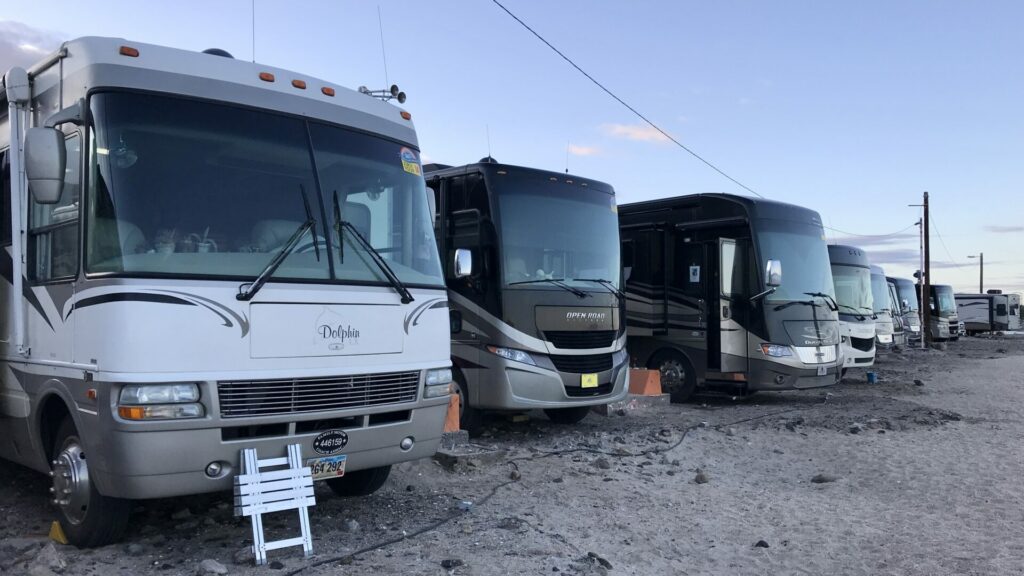
Manufacturer Reputation
Research the reputation of the RV manufacturer. Some brands are known for their reliability and customer satisfaction, while others may have a history of quality issues. This information can influence your decision, so it’s important not to skip this step.
We purchased a Grand Design because we knew they covered warranties for full-time RVers and had a great customer service reputation.
As we mentioned before, you can join specific manufacturer Facebook groups to get a sense of how customers feel about the brand and service.
Available Features
Be sure to consider the features and amenities that are important to you. New RVs often come with the latest upgrades, but some used models may already have added features from previous owners.
When we bought our second RV, we opted for a used truck camper. Because we wanted to renovate an RV with certain features, our process of finding the right used floorplan was critical. We wanted a side entry door, one slide-out, and a dry bath
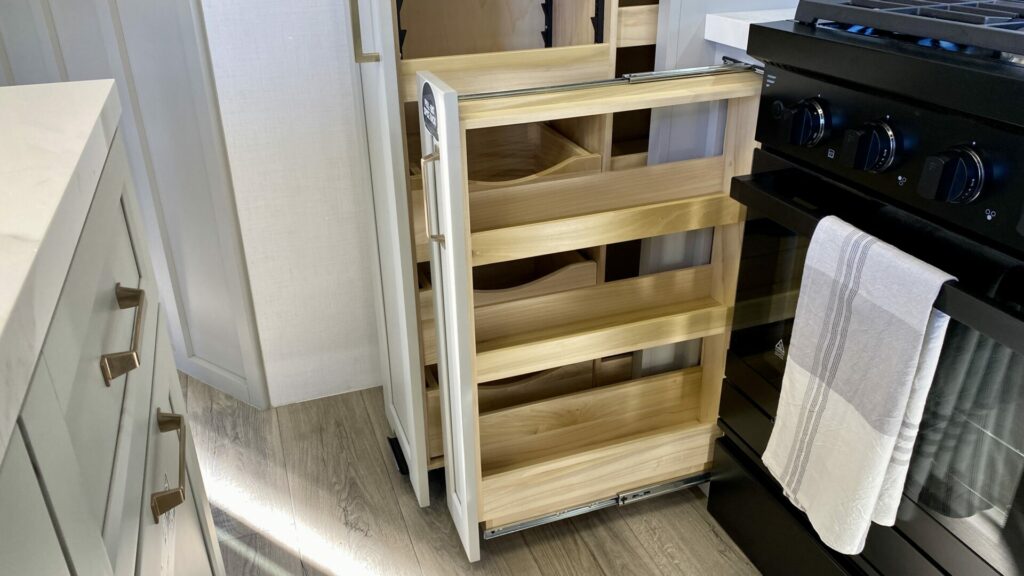
Financing Options
Buying a new RV will typically allow you to secure better terms for your loan. You can usually get a lower interest rate, lower down payment requirement, and multiple-term length options when purchasing new.
On the flip side, interest rates are generally a little higher for a used RV. You usually have to make a larger down payment, as well. Due to the age of the unit, most banks will not allow very long-term lengths on a used purchase.
Doing a little bit of research can save you thousands of dollars over the life of your loan. Interest rates, loan terms, and down payment requirements can vary, affecting the overall affordability of your purchase.
Be sure to check out banks, credit unions, and online lenders to determine who can offer you the best choice.
Ownership Experience
Consider your preferences regarding the ownership experience. Some individuals enjoy the process of customizing a new RV, while others appreciate the character and history that come with a used vehicle.
Lifestyle and Travel Considerations
Do you have a favorite campground or certain places in mind that you’d like to visit? You need to check on their policies for the types of RVs that are allowed in their campground.
Some campgrounds have restrictions on the age of the campers that are allowed to stay at their campsites, commonly called the 10-year rule.
Buying new should prevent you from encountering any issues like this when exploring new campgrounds. If you do shop used, you can likely avoid these issues by selecting an RV that is not more than a few years old.
Lastly, consider your lifestyle, travel frequency, and the size of your travel party. These factors can influence the type and size of RV that is most suitable for your needs.
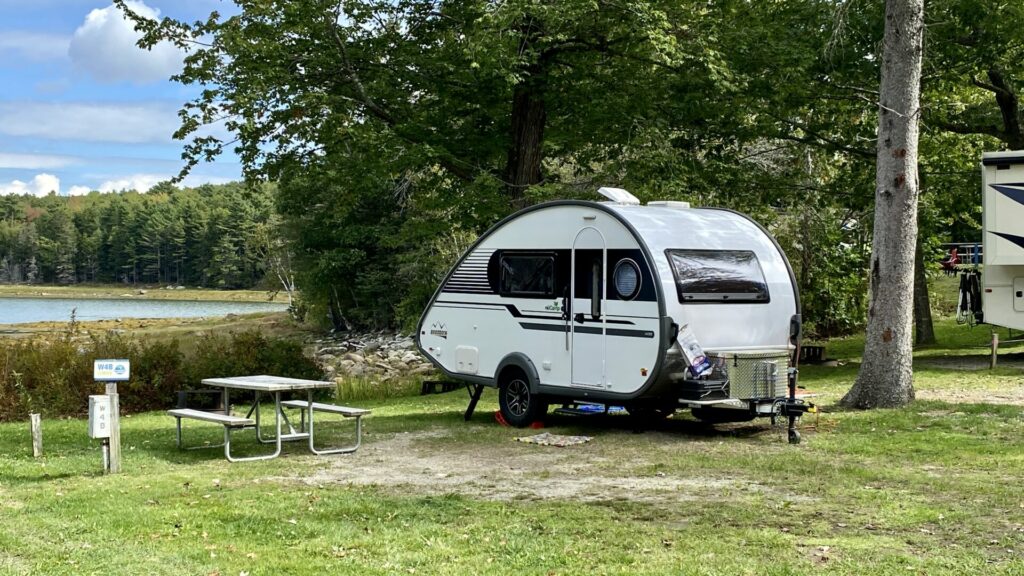
Likelihood of a Renovation
RV renovations are becoming increasingly popular among RV enthusiasts and hobbyists. Many are even living a full-time RV lifestyle in these older, renovated units. If you didn’t know, we fully renovated our 2006 Lance truck camper.
Like us, some people prefer to take older units and renovate them to brand new condition. If this is you, then used is the way to go.
If you have bought a new RV, you likely don’t want to start ripping things out and customizing the space. Although we have seen it done!
Most people who purchase new do it because they don’t want to worry about changing or fixing anything for several years. They prefer the “new RV” smell and would rather spend their time on road trips instead of with a hammer and wrench.
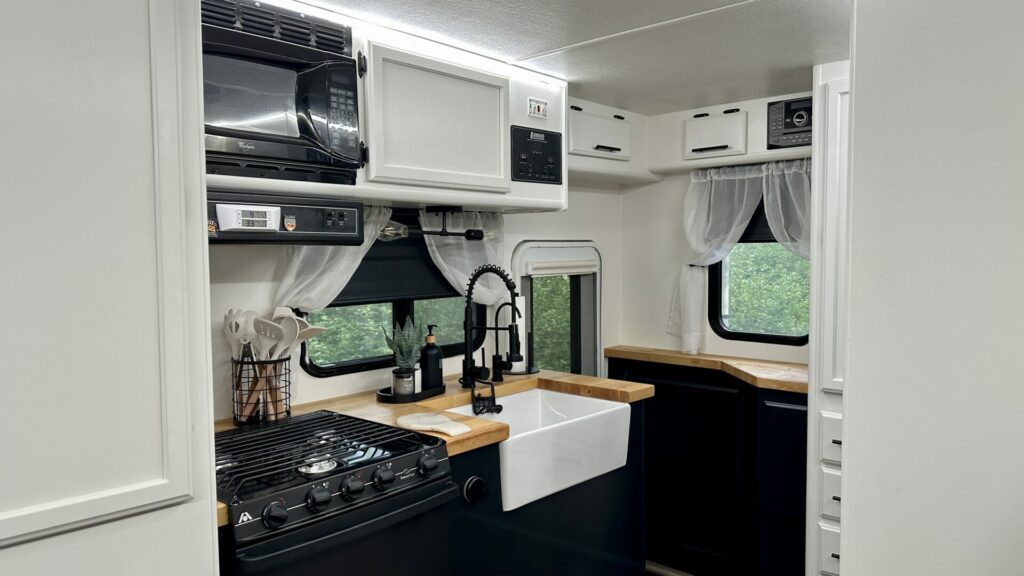
Which Wins the Used vs New RV Debate In Your Book?
Whether you’re enticed by the allure of a brand-new adventure on wheels or captivated by the character etched into a well-loved traveler, the decision ultimately rests on your individual preferences, budget, and travel aspirations.
Regardless of your choice, these facts should arm you with the information you need to make an informed decision.
It doesn’t matter what type of RV you select; you can find great options on both the new and used market. Decide which factors are most important to you, and then start looking.
Remember, there’s no one-size-fits-all answer. As long as you are happy with your purchase, then that’s what matters!




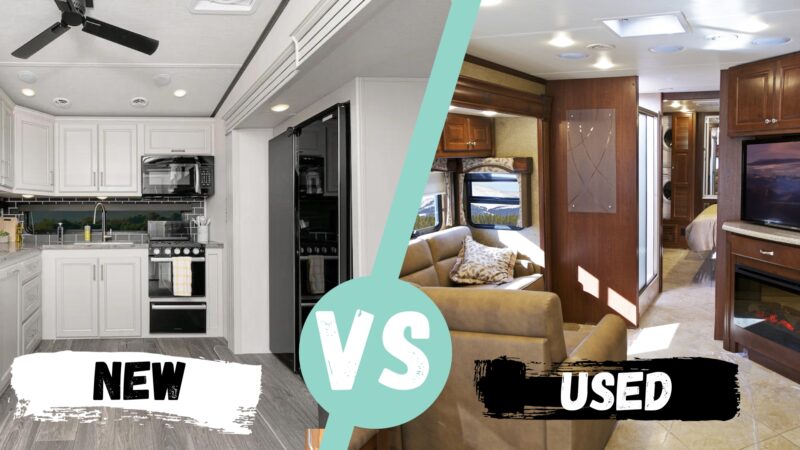
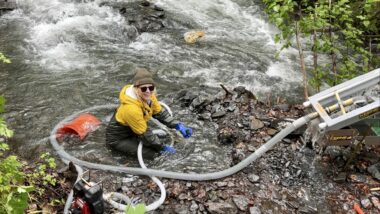

Hi Jason,
I just bought your check off lists, maybe twice but I will confirm before getting back to you, as they appear to be the most comprehensive out there. My wife and I are considering full-time RVing and are look at the Grand Design 367BHS. We currently live in Simi Valley, CA, and have been working with Mike Thompson RV during this process. Being from LA, did you guys use the same dealership or do you have a recommendation for another?
My wife and I enjoy your show and look forward to you and Rae having a safe and enjoyable 2020, that include more videos on your adventures and experiences.
Sincerely,
Jos Ferguson
Hey Jos, Rae and I actually went to Simi High! Thank you so much for the kind words. We purchased our RV from Mike Thompsons but didn’t love them. We felt like we were on our own after we signed the financing. I would personally recommend considering driving to Lazydays in Tucson where you get to stay in the campground attached to the dealership and perform your PDI on-site (a big plus) or Blue Dog RV in Las Vegas (we called them for maintenance work our first 3 months on the road and although we didn’t get it done there they were VERY helpful over the phone explaining the whole process and how it all works. Other dealerships we contacted including Mike Thompsons were less than helpful to us newbies). We have never purchased an RV from these dealerships but in our interactions with them, they both gave us good feelings. Because you are thinking of going full-time, the benefit of purchasing close to home for a better dealer relationship and convenience for maintenance work doesn’t matter.